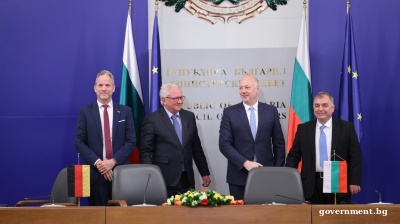After months during which food prices rose at rates not seen in a generation or more, the founders of several food waste apps active in Central and Southeast Europe say they have seen a sudden upturn in the number of users.
Food waste apps have been around for a few years now, with users motivated by a combination of seeking to reduce their environmental impact — food production is a massive contributor to emissions and a worryingly large amount of food is wasted — and the need for those on tight budgets to find cheap (or free) food to feed themselves and their families.
The world is now into a second year of strongly rising food and energy prices, a trend that started as the global economy started recovering from the coronacrisis, followed by a sharp acceleration after the start of the war between Russia and Ukraine, two of the world’s top wheat exporters. Making the situation even worse, much of Europe was affected by drought this summer.
Today, the rising cost of living is pushing households into poverty as prices of food and energy increase, and in response more people are turning turn to apps redistributing unwanted food to those that can use it. As part of this international trend, there are a number of apps in the Central and Southeast Europe region that have been growing in popularity recently.
Albert Wettstein, co-founder of Hungarian app Munch, says there has been an increase in take-up of the app amid high inflation and shortages. To date, 300,000 people have downloaded the app in Hungary, and more than 240,000 meals have been saved from the bin, a number that is growing day by day.
In Hungary, where Munch is based, inflation jumped to a 24-year high in August, reaching 15.6%. Commenting on the causes of the crisis, Gergely Gulyas, the prime minister's chief of staff, said the following month that the war in Ukraine and the related sanctions had led to "a brutal rise in energy prices", leading in turn to soaring food products. That prompted the government to extend the price caps on basic foodstuffs and fuel until the end of 2022.
It’s a similar situation in Serbia, where startup EatMeApp has developed a smart assistant that helps users make educated decisions about how and when to use their food. The company’s co-founder, Aleksandra Lazovic-Lønningen, told bne IntelliNews in an interview earlier this year: “[The] unfortunate times that we are witnessing are rising awareness about personal financial sustainability.” Serbia’s government too has imposed price caps on a range of basic foodstuffs and restricted exports.
In Bulgaria, where Foody.to helps redistribute unwanted food as well as sharing inspiring content for local foodies, consumer prices increased by 17.7% year on year in August, pushed up by a 24.1% y/y hike in food prices. Meanwhile, incomes are failing to keep pace with the sharp increase in consumer spending.
Over the last few years a number of other food waste and food sharing apps have launched and subsequently folded. Now, the financial squeeze has caused a fundamental shift in attitudes. “Most startup founders spend plenty of time building their products, making some plans and elaborating on complex and long-term strategies. However, fewer founders really ask themselves the most important question: Is their product really coming at the perfect time?” says Gregoire Vigroux, co-founder of Romania’s Bonapp.eco.
He and his partners launched Bonapp.eco in November 2021 "in the midst of the coronavirus storm, when food prices had started to increase significantly”. Since then the increase has accelerated. In August 2022, food prices saw their fastest increase since the 1989 revolution this August, shooting up by 18.2% y/y. As a result, Vigroux says, “I believe the timing of Bonapp.eco is just perfect.” To date, the app has 40,000 downloads and is eyeing further expansion.
How the apps work
The apps launched in the region have a variety of different methods, but most source unwanted food from shops and eateries and make it available to consumers via their apps cheaply (or in some cases for free).
“Our mobile app addresses the problems of food waste and inflation, by connecting users with local food retailers, including grocery stores, restaurants, gas stations, bakeries, coffee shops and hotels,” Vigroux explains.
“Through the app, users can purchase food that is approaching its expiration date, at a discount from 50% to 80%. Our mission is to turn the environmental, economic and social challenges caused by food waste into a sustainable business opportunity to the benefit of everyone.”
Similarly, Munch, founded by Wettstein and three fellow university students, makes it possible for bakeries, restaurants, shops and other venues to sell or donate their unsold food at a discounted price via the app.
Bulgaria’s Foody.to was launched by two sisters – Svetoslava (Sissi) and Denitsa Simeonovi – at the beginning of 2021 with the aim of reducing hospitality food waste. The pair had previously started the successful Sofia2Go Instagram food blog, and according to Sissi Simeonovi, Foody.to – the first platform of its kind in Bulgaria – “is not only a platform for reducing food waste, but it is also a ‘foody guide’ for the best places to eat, drink and enjoy in Sofia, Varna and several other Bulgarian cities (to be announced soon). People like to save food, but they like even more to explore, so we provide them with both opportunities.”
Serbia-based EatMeApp is rather different, as it is a smart assistant aimed at consumers. “Most of the food waste apps are targeting businesses such as restaurants and grocery shops, offering users to decrease waste on the business side. We solve household food waste – so, we are on the side of the citizens,” adds Lazovic-Lønningen. “Why? Because we believe that most important and numerous agent[s] of change are – us… People, citizens.”
Food for all
In Emerging Europe in particular the motivation for using food waste apps is more likely to be financial than in the richer Western countries, where environmental sustainability is more of a factor, though for many users both issues pushed them to install apps to help reduce food waste. And these days, even in the affluent West the cost of living crisis is driving more people to food banks and other sources of free and cheap food.
Sky-high food prices aren’t likely to ease any time soon. According to a World Bank update on September 15, food price inflation remains high around the world, affecting almost all low-income and middle-income countries, and most high-income countries too. “The war in Ukraine has altered global patterns of trade, production and consumption of commodities in ways that will keep prices at high levels through the end of 2024, exacerbating food insecurity and inflation,” commented the World Bank.
“Not only are consumers looking at cheaper food alternatives, but also, they are increasingly driven by eco-friendly consumer behaviours,” said Vigroux. He points to data showing around 5mn tonnes of food are thrown away every year in Romania. Yet at the same time, Romanian consumers devote almost 40% of their budget to food and beverages, compared to only 10% in France and Germany. “And food prices in Romania are booming!” he stressed.
A survey of 100 Bonapp.eco users revealed that 70% were primarily driven by making savings, whereas 30% use the app to have a positive impact on the environment. “I believe the number of consumers using bonapp.eco to have a positive impact on the environment is going to increase, as I see environmental awareness rising like never before in Romania,” he comments.
While Romania is one of the poorest EU countries, the Western Balkan countries including Serbia lag further behind economically.
“Western Balkan users recognise the food waste problem through the financial angle and hunger, while European user [does so] as the climate problem,” commented Lazovic-Lønningen.
“If there can be any good in these serious and challenging times that we are living – pressure to live more sustainably is one of those moments.”
The profile of Foody.to’s users is somewhat different. “We have seen a rise in users due to many reasons – the fact that our platform becomes more popular because more and more businesses recognise the need to join us and indeed more and more clients seek to save money and well, save the planet,” said Simeonovi.
“Our clients are not so motivated by the lower prices, though this is an important factor, too, as they want to discover new tasty places and support a meaningful cause,” she added. “We are happy that we created a community of foodies who care for the food not to be wasted and are ready to support emerging businesses like ours in times when it is not easy to develop such a platform.”
Reducing food waste
At the same time, there is growing awareness of the huge amount of food that is produced and then wasted, and the environmental impact of this.
According to Simeonovi, Foody.to was inspired by a combination of the sisters’ appreciation of good food and the realisation of the massive food waste problem. “During the months before the launch, it was hard to get any proper data on food waste,” commented Simeonovi. By talking to numerous chefs and shop owners, the two realised what a big issue food waste is in Bulgaria and how important it is to fight it.
A recent study by the NGO Feedback EU showed that the EU imported almost 138mn tonnes of agricultural products in 2021, at a cost of €150bn, but in the same year it wasted an estimated 153.5mn tonnes of food. The figure is considerably higher than official EU statistics that exclude most on-farm food waste. According to the report, an estimated 20% of EU food production is currently wasted, and wasted food is responsible for at least 6% of the EU’s total greenhouse gas (GHG) emissions.
“At a time of high food prices and a cost-of-living crisis, it’s a scandal that the EU is potentially throwing away more food than it’s importing,” commented Frank Mechielsen, executive director at Feedback EU, at the launch of the report in September.
According to Munch’s Wettstein, one third of food is wasted in Hungary or about 1.8mn tonnes per year (tpy), or 67kg per person. “This is less than in the US but higher than some of the other European countries. Prices are increasing insanely but we are still throwing away too much food. If the food we threw away went to people in need, we could end hunger,” Wettstein said.
Both he and Lazovic-Lønningen reflected on the generational change in attitudes to food in the region.
“After high school one of our founders used to go and sit in a bakery and at the end of the day they would collect the unsold produce, put it in a bag and throw it away. It hurts to see something like this. My grandparents were in a Soviet labour camp and food was sacred,” said Wettstein.
"My generation is able to buy as much as we need. However, priorities have changed because of the huge inflation and shortages, which helped people understand the need to be careful. Now, 300,000 people have downloaded the app in Hungary.”
“Our grandmothers and their attitude about food are our inspiration. They built into our DNA that throwing food is not under any circumstances a reasonable thing to do,” Lazovic-Lønningen said. “So one day in front of the open refrigerator it struck me while I was getting ready to throw away a chicken filet (again!) – what if we have an app that sends reminders about food expiration dates? Eat Me App conceptually grew since then, but its core mission is to assist people in making conscious and educated food consumption decisions.”
Commenting on the scale of the problem, she added: “Food waste is the third-largest greenhouse gas emitter … It is a systemic problem.” She cited data showing that household food waste accounts for 60% of total food waste, with the average family of four throwing away €30-50 of food every week.
Beyond business
One thing that stood out from all of the interviewees was that the founders of the apps are passionate about what they are doing, and this goes beyond creating a business. They also talked about creating a community and changing people’s habits for the better.
“Eat Me App has for a mission a permanent shift in people’s behaviour toward food. The business as usual model is unacceptable. Our vision is conscious and aware citizens when we talk about food related habits,” Lazovic-Lønningen explained.
As well as the service it offers via the app, Munch aims to help its users become more sustainable. “We see sustainability as not just environmental sustainability. We want to encourage democratic sustainability for everyone, with low barrier-solutions,” said Wettstein. “For example, Munch is popular in Hungary on TikTok and Instagram, where we share tips on how to be more sustainable in everyday life. We post recipes to use seasonal fruit and vegetables, or educational tips such as on the difference between expiry and best before dates — one big reason for food waste.”
Founders of food waste apps interviewed by bne IntelliNews also outlined ambitious expansion plans.
Munch already has a team of 20 and is working on expansion to other regions, cities and countries in the region. “Our goal is to build the biggest food waste company fighting hunger, high prices and food waste in the Central and Eastern Europe region,” said Wettstein. The company is currently exploring potential collaboration with companies in the Czech Republic.
Lazovic-Lønningen names “going global” as one of the Eat Me App’s founders’ ambitions. After organic growth among early adopters, it launched a user acquisition strategy over the summer.
Vigroux said Bonapp.eco's ambition is to “create the best food waste mobile app in Europe”. When the team reaches this goal, and also has 1,000 affiliates in Romania, “we will do a new fundraising to deploy across Eastern Europe, and become the leading player in the region,” he added.
The company is currently building up its network of affiliates, and has already sealed deals with ten of the top 12 food retailers in Romania. These will add to the 500 partners – local food retailers, including grocery stores, restaurants, gas stations, bakeries, coffee shops and hotels – it has on-boarded so far.
The energy crisis has already encouraged governments to look at new investments into renewables as a way of boosting domestic generation and long-term energy security. Meanwhile, as the food crisis continues – the World Bank does not expect an easing of food prices until the end of next year – a similar change may be on the verge of happening in the food industry. Rising prices and fears of shortages are causing consumers to look not just to the thrifty ways of the past but also to the apps of the future.
Features

COMMENT: For Asia, dealing with Europe isn’t about achieving success; it’s about concealing failure
To be taken seriously in Asia, Europe must rediscover the courage to deliver, not merely declare. Asia has moved on to execution. Europe is still editing its initial policy draft.

Washington has a new focus on a Caspian energy play
For most of the last three decades since winning independence, Central Asia has been a bit of a backwater. Not any more. The Trump administration is becoming more focused on Turkmenistan's vast gas reserves and can smell money and power there.

BOTAŞ and Turkey’s hub ambition: from “30-year dream” to cross-border reality
For Ankara, the symbolism is as important as the molecules: Turkey’s energy map is shifting from end-market to hub.





